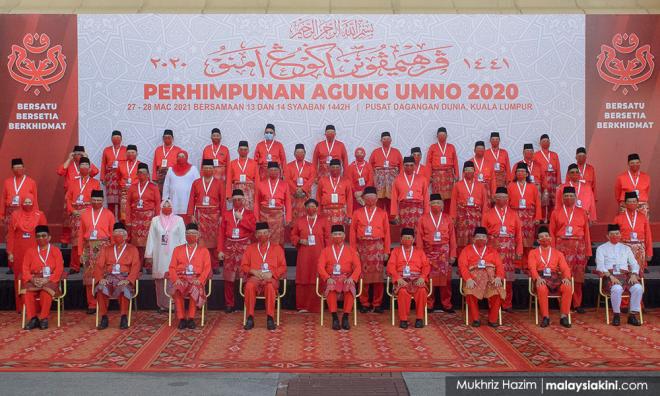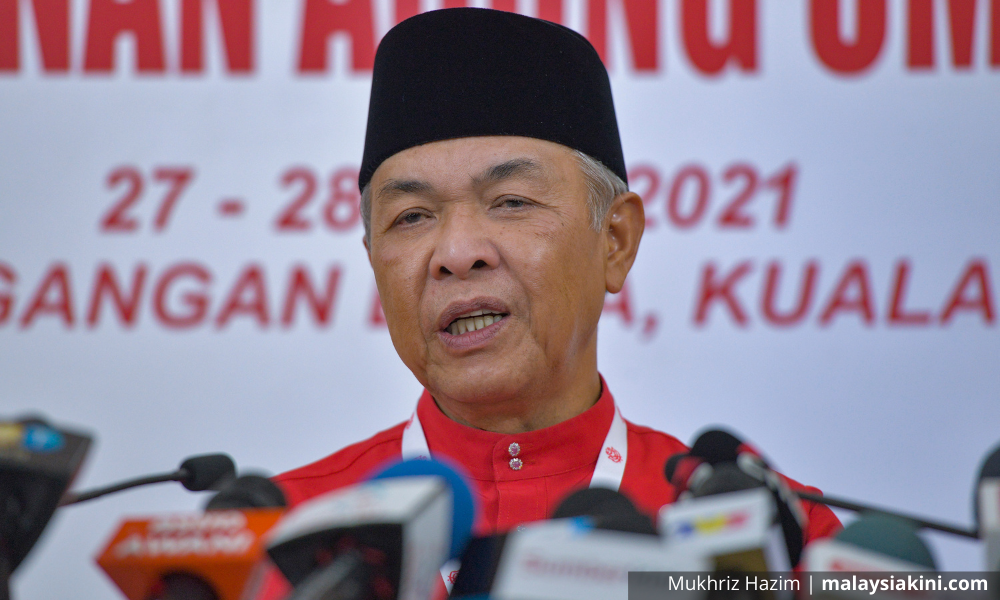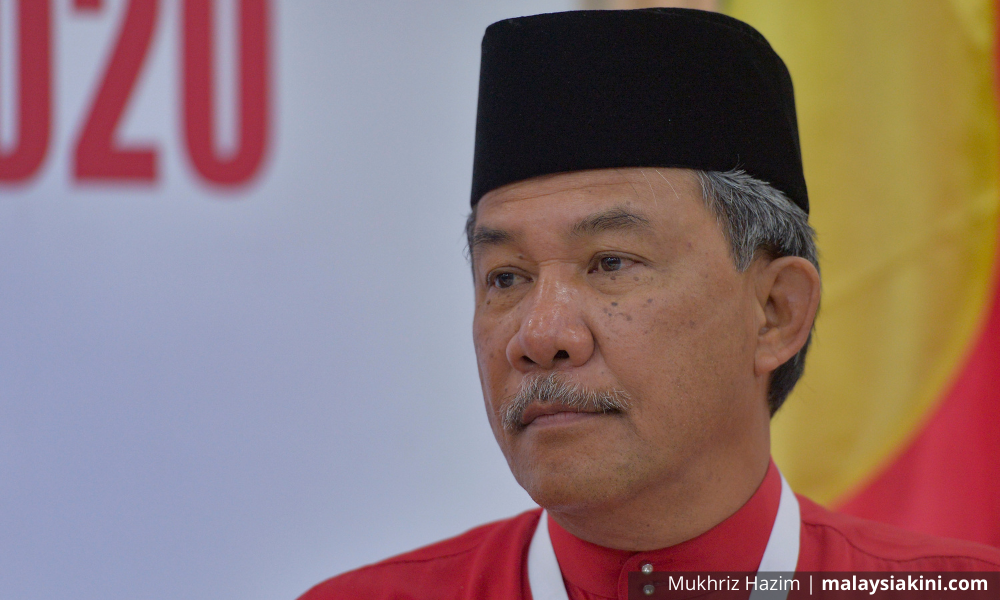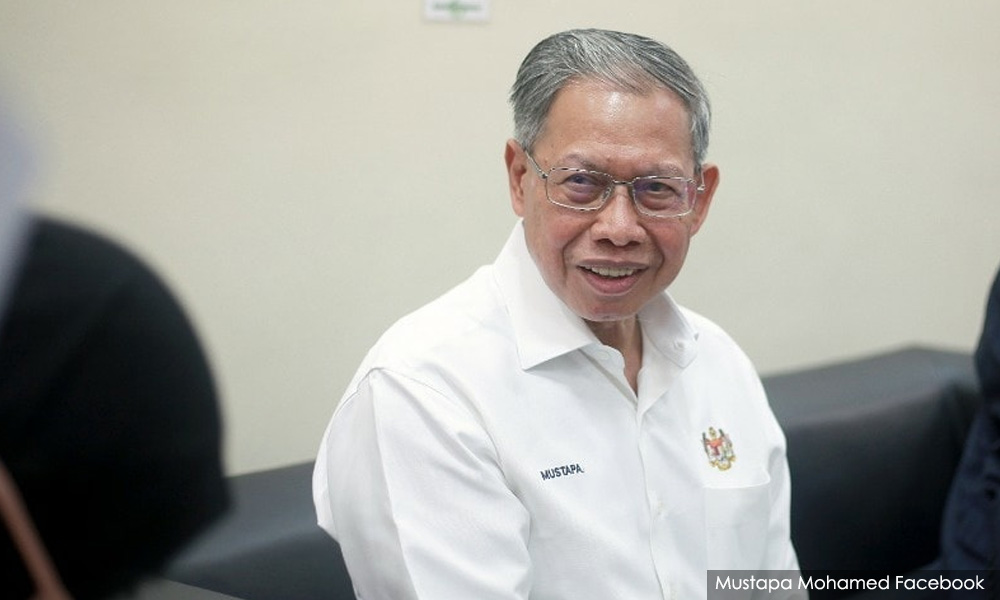
Umno likely to gain from divorce from Bersatu, analysts say
ANALYSIS | During the Umno general assembly over the past weekend, there were two main schools of thought. One was that the party could no longer play second fiddle to Bersatu and must withdraw from the Perikatan Nasional (PN) government.
The other was that divorcing Bersatu would only spell doom for Umno in the 15th general election (GE15).
One proponent of the second scenario was Umno supreme council member Zahidi Zainul Abidin who said the party must go into the elections with Bersatu and PAS. He believed Umno will come out on top and be in a dominant position when the next government is formed.
Conversely, he said if Umno were to go solo in the election, the party might be left on the opposition bench with no allies.
However, several analysts told Malaysiakini that this description by Zahidi misses the point - if Umno went it alone, there would be room for the party to form a coalition with new or old partners after the election.
Ilham Centre executive director Hisomuddin Bakar said Umno on its own appeared confident that it could retain all 55 seats it won in GE14, including those "stolen" by MPs who defected to Bersatu.
Additionally, he said Umno could be eyeing at least 16 other Malay-majority seats for an overall target of at least 70 MPs in Parliament. The seats were said to be from those currently held by PAS, Bersatu, or Pakatan Harapan components PKR and Amanah.
“If PAS chose to be with Bersatu, Umno could retake several seats where they fell in three-cornered fights with PAS, for example in Terengganu, Kedah, and Kelantan.
“And there are the 13 seats won by Bersatu. Umno is very confident it could reclaim its traditional seats, including Langkawi. Aside from Jerlun and Pagoh, the remaining seats they appear to be very confident,” he said.
As for Malay-majority seats held by Harapan parties, Hisomuddin identified Kuala Selangor and Kulim Bandar Baru as being possible targets for Umno, with a record of “swing results” between BN and Harapan candidates across several general elections.
The other was that divorcing Bersatu would only spell doom for Umno in the 15th general election (GE15).
One proponent of the second scenario was Umno supreme council member Zahidi Zainul Abidin who said the party must go into the elections with Bersatu and PAS. He believed Umno will come out on top and be in a dominant position when the next government is formed.
Conversely, he said if Umno were to go solo in the election, the party might be left on the opposition bench with no allies.
However, several analysts told Malaysiakini that this description by Zahidi misses the point - if Umno went it alone, there would be room for the party to form a coalition with new or old partners after the election.
Ilham Centre executive director Hisomuddin Bakar said Umno on its own appeared confident that it could retain all 55 seats it won in GE14, including those "stolen" by MPs who defected to Bersatu.
Additionally, he said Umno could be eyeing at least 16 other Malay-majority seats for an overall target of at least 70 MPs in Parliament. The seats were said to be from those currently held by PAS, Bersatu, or Pakatan Harapan components PKR and Amanah.
“If PAS chose to be with Bersatu, Umno could retake several seats where they fell in three-cornered fights with PAS, for example in Terengganu, Kedah, and Kelantan.
“And there are the 13 seats won by Bersatu. Umno is very confident it could reclaim its traditional seats, including Langkawi. Aside from Jerlun and Pagoh, the remaining seats they appear to be very confident,” he said.
As for Malay-majority seats held by Harapan parties, Hisomuddin identified Kuala Selangor and Kulim Bandar Baru as being possible targets for Umno, with a record of “swing results” between BN and Harapan candidates across several general elections.

Harapan defeated Umno candidates in the two seats in GE14, while Umno, in GE13, defeated then Pakatan Rakyat candidates who won in GE12.
“The target of 70 seats is significant for Umno to propel them as the single largest party in Parliament.
“After that, they will open the doors for discussion with other winning parties, to form a government on Umno’s terms,” said Hisomuddin.
Unlike past general elections, he said there could be more uncertainties surrounding the outcome of GE15, with no formal coalition set prior to the polling day.
“This situation will give rise to uncertainties because its outcome lies more in which party has the strength to win their seats, and also involve post-election discussions,” he said, adding that negotiations could even involve rival parties.
Leaving negotiations for after the election
University Malaya political analyst, associate professor Awang Azman Awang Pawi, said that Umno, in its quest to attain dominance, has discarded the need for pre-election seat negotiations, particularly with Bersatu.
“This is a strategy. Rather than fight for seats before contesting, it is now open for all (to contest), and it could be determined later whether to retain the PN bloc or form new political coalitions,” he told Malaysiakini.
“Between 70 and 75 seats would be the maximum number possible to be won by Umno to emerge as the single most dominant party,” he said.
Awang Azman said Umno’s solo quest in Malay-majority seats could also benefit voters who are free to support their preferred candidates, unlike a coalition situation where voters in an area dominated by supporters of one party would have to vote for an allied party that was allocated the seat.
At the Umno assembly, which concluded yesterday, the party leadership received a clear mandate to decide when to withdraw support from PN. This followed a "clean break" decision which was reached by the Umno Supreme Council to sever ties with Bersatu.
Umno deputy president Mohamad Hasan had in January reportedly said that his party, while taking into account then discussions with BN components, Bersatu, and PAS, aimed to contest in at least 96 out of 222 Parliament seats.
“The target of 70 seats is significant for Umno to propel them as the single largest party in Parliament.
“After that, they will open the doors for discussion with other winning parties, to form a government on Umno’s terms,” said Hisomuddin.
Unlike past general elections, he said there could be more uncertainties surrounding the outcome of GE15, with no formal coalition set prior to the polling day.
“This situation will give rise to uncertainties because its outcome lies more in which party has the strength to win their seats, and also involve post-election discussions,” he said, adding that negotiations could even involve rival parties.
Leaving negotiations for after the election
University Malaya political analyst, associate professor Awang Azman Awang Pawi, said that Umno, in its quest to attain dominance, has discarded the need for pre-election seat negotiations, particularly with Bersatu.
“This is a strategy. Rather than fight for seats before contesting, it is now open for all (to contest), and it could be determined later whether to retain the PN bloc or form new political coalitions,” he told Malaysiakini.
“Between 70 and 75 seats would be the maximum number possible to be won by Umno to emerge as the single most dominant party,” he said.
Awang Azman said Umno’s solo quest in Malay-majority seats could also benefit voters who are free to support their preferred candidates, unlike a coalition situation where voters in an area dominated by supporters of one party would have to vote for an allied party that was allocated the seat.
At the Umno assembly, which concluded yesterday, the party leadership received a clear mandate to decide when to withdraw support from PN. This followed a "clean break" decision which was reached by the Umno Supreme Council to sever ties with Bersatu.
Umno deputy president Mohamad Hasan had in January reportedly said that his party, while taking into account then discussions with BN components, Bersatu, and PAS, aimed to contest in at least 96 out of 222 Parliament seats.

This figure was lower than the 121 seats it contested in GE14, of which Umno won 55, amid an unprecedented assault from Harapan in its strongholds with former premier Dr Mahathir Mohamad as Bersatu’s president.
In GE14, Umno faced multi-cornered fights with Bersatu and PAS candidates in 47 Parliament seats, including in Ketereh and Titiwangsa. Former BN secretary-general Annuar Musa defeated Senior Minister Radzi Jidin in Ketereh, while Bersatu’s Women, Families, and Community Development Minister Rina Harun took down Umno’s Johari Abdul Ghani in Titiwangsa.
Bersatu, as a then Harapan component, fielded 52 Parliament candidates, but only won 13. Its current count of 31 MPs includes post-GE14 Umno defectors and a group of former PKR MPs, whose defections triggered Harapan's downfall in what is known as the Sheraton Move last year.
Umno fundamentally better organised
Universiti Teknologi Malaysia political analyst Prof Azmi Hassan, however, said Umno’s strength as an organisation gives it the advantage to reclaim the seats it lost through defections.
“If we see the Umno’s seats which were ‘taken’ by Bersatu, Umno’s chances to win is very good, while Bersatu will face a difficult challenge to retain the seats.
“Even for people like Tok Pa,” said Azmi, in reference to de facto Economic Affairs Minister Mustapa Mohamed, a five-term Jeli MP.
Mustapa first won the Jeli seat for BN when the constituency was created in 1995, subsequently losing it to PAS in 1999, and has held the seat since 2004. He had a brief stint as an Independent MP following BN’s GE14 loss, before formally joining Bersatu.
In GE14, Umno faced multi-cornered fights with Bersatu and PAS candidates in 47 Parliament seats, including in Ketereh and Titiwangsa. Former BN secretary-general Annuar Musa defeated Senior Minister Radzi Jidin in Ketereh, while Bersatu’s Women, Families, and Community Development Minister Rina Harun took down Umno’s Johari Abdul Ghani in Titiwangsa.
Bersatu, as a then Harapan component, fielded 52 Parliament candidates, but only won 13. Its current count of 31 MPs includes post-GE14 Umno defectors and a group of former PKR MPs, whose defections triggered Harapan's downfall in what is known as the Sheraton Move last year.
Umno fundamentally better organised
Universiti Teknologi Malaysia political analyst Prof Azmi Hassan, however, said Umno’s strength as an organisation gives it the advantage to reclaim the seats it lost through defections.
“If we see the Umno’s seats which were ‘taken’ by Bersatu, Umno’s chances to win is very good, while Bersatu will face a difficult challenge to retain the seats.
“Even for people like Tok Pa,” said Azmi, in reference to de facto Economic Affairs Minister Mustapa Mohamed, a five-term Jeli MP.
Mustapa first won the Jeli seat for BN when the constituency was created in 1995, subsequently losing it to PAS in 1999, and has held the seat since 2004. He had a brief stint as an Independent MP following BN’s GE14 loss, before formally joining Bersatu.

Minister in the Prime Minister's Department (Economic Affairs) Mustapa Mohamed
“We see Tok Pa’s victory, his charisma is synonymous with Jeli, but he must still be strengthened by Umno as an organisation.
“It would be difficult for him to win the seat on a Bersatu or PN ticket because to me the organisation of Umno and Bersatu grassroots is vastly different,” he said.
Discussion among parties in Parliament to form a federal government after the election results is a norm across many democracies, including in countries with different electoral systems.
In Malaysia, however, the electoral battle has often been waged between two main coalitions. Any subsequent change of government at the federal or state levels has so far been triggered by controversial defections.
“It would be difficult for him to win the seat on a Bersatu or PN ticket because to me the organisation of Umno and Bersatu grassroots is vastly different,” he said.
Discussion among parties in Parliament to form a federal government after the election results is a norm across many democracies, including in countries with different electoral systems.
In Malaysia, however, the electoral battle has often been waged between two main coalitions. Any subsequent change of government at the federal or state levels has so far been triggered by controversial defections.
A lot of Kangkung analysts in Malaysia.
ReplyDeleteNo less adding u!
DeleteI have Zero respect for Zombies, either Red or Green Zombies
DeleteLikewise from me towards demoNcratic mfers of all hues!
Deletethis news or view wrt no ball umno is getting repetitive n boring.
ReplyDelete